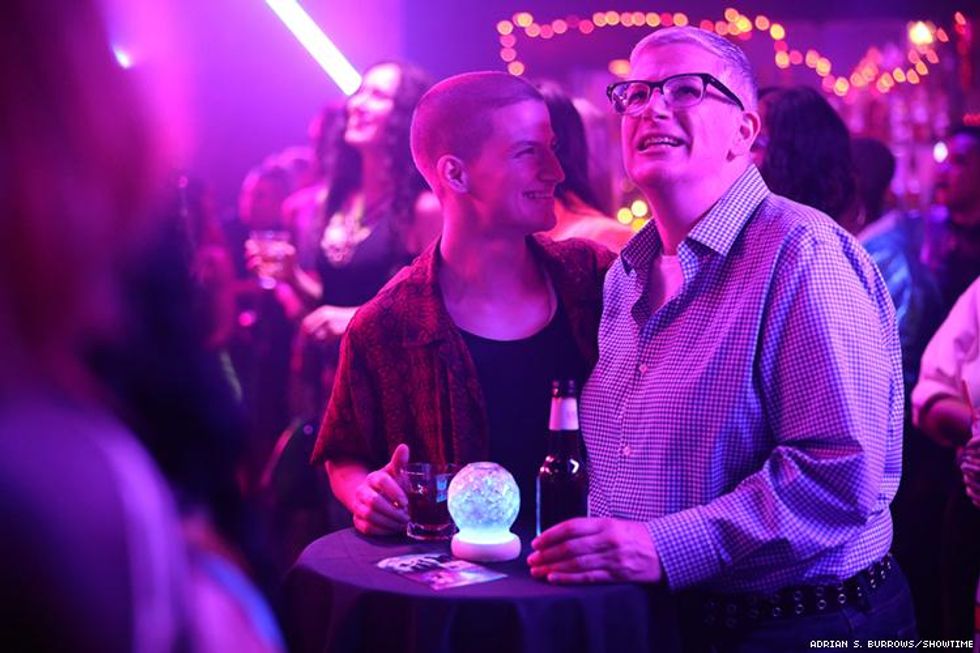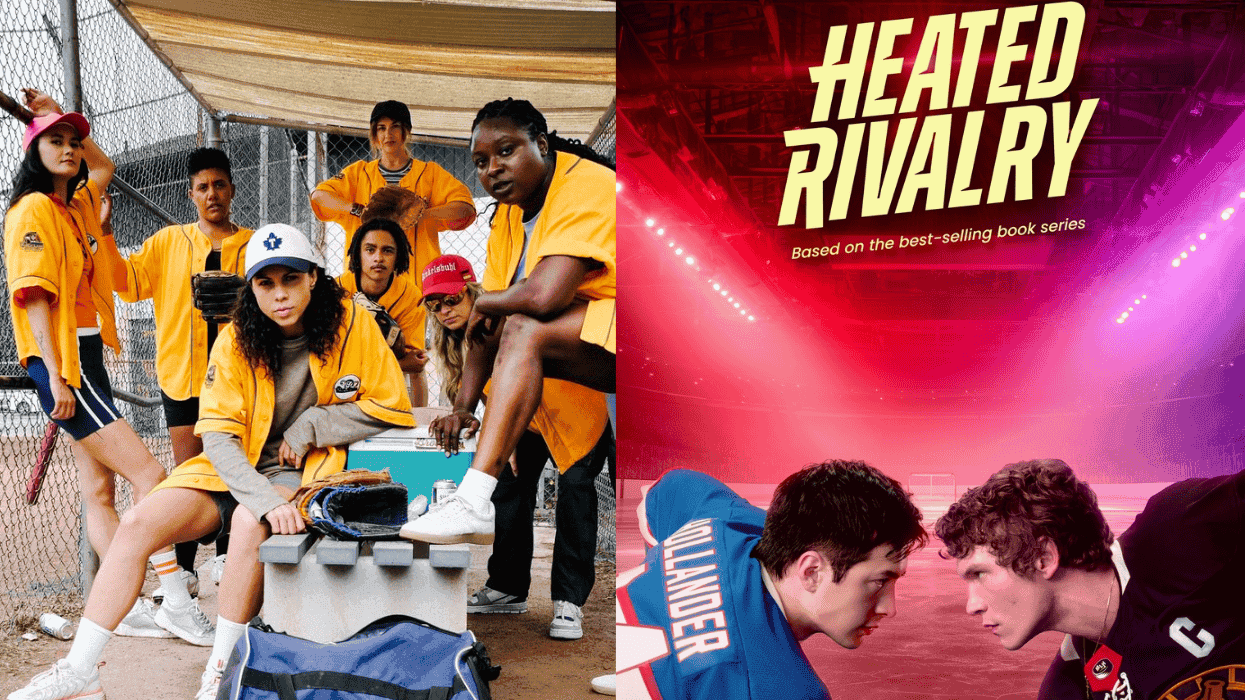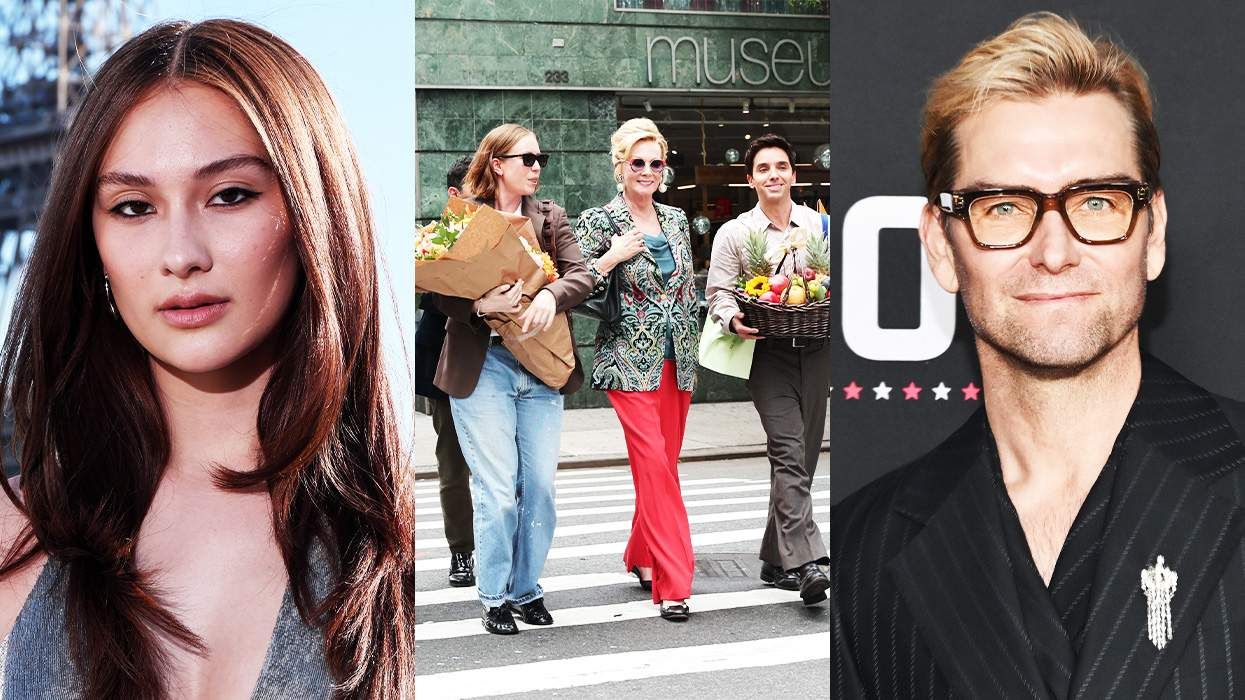"There is a fat, gray-haired, masculine woman who is the lead of a show. That is bonkers." When Work in Progress premiered on Showtime last week, Abby McEnany became one of the first and only butch women to lead a television series, a fact that she describes as "revolutionary". Adding to that, McEnany's love interest is trans (played by rising star, Theo Germaine), another rarity on screen.
On this week's LGBTQ&A podcast, McEnany talks about coming up in the Chicago improv scene, the SNL character played by Julia Sweeney, Pat, and why she stopped describing herself as a lesbian.
You can read an excerpt below and listen to the full interview on Apple Podcasts.
Jeffrey Masters: You talk in the show and in interviews about having depression. How has such a massive change -- being the lead of a show, having your face on billboards -- affected your mental health?
Abby McEnany: I have to say, I think it's very scary. My meds are really good. My antidepressants are really good right now. I have a great therapist. I have an amazing group of friends that I've known forever that love me and support me. I have an amazing family. The team on the show is great. I've just been very, very supported. I don't know how to explain it.
So, honestly, I'm very terrified. You know what I mean? It's very scary about not being anonymous, but I think I'm in the best possible position I could be, which is pretty lovely.
JM: Your character in the show says the SNL character, Pat, made your life a living hell. Were you called Pat by both queer and straight people?
AM: I was called Pat by a lesbian in a lesbian bar in the '90s. It's like, Wow. Especially back then, it was really important -- I mean, it's still important -- to find safe places. But boy, that was heartbreaking.
That really made me think the idea of the lesbian community, that's a misnomer because I can't even go to a safe space and feel safe. I'm being insulted for the way I look and how I'm presenting myself. It's like, Are you kidding me?
JM: Has that changed in lesbian spaces?
AM: Well, I have to say, lesbian spaces are disappearing. There used to be a bunch of lesbian bars in Chicago, and I can't name one. Also, I don't identify as a lesbian anymore. I identify as a queer dyke or a queer woman.
There aren't any lesbian spaces that I can find or they're disappearing, and that's horrible. My friend, Kareem and I were at one of the best bars in the world, Big Chicks in Chicago. It's amazing. One time, this group of straight folks came in. I go to gay bars with straight folks all the time, but these people were treating us like zoo animals. You know what I mean? Sometimes we can't even have a sacred space of safety.
JM: There's a line in the TV show, "I'm not a lesbian because lesbians are old women." I was wondering how much of that is a joke vs. something you actually think?
AM: I love, especially for me and it's only in the last three years, the idea of gender fluidity, sexual fluidity, all that stuff. I think that's such a beautiful idea: Everything, you can be fluid. Things can change.
So, my identity, when I came out, of course, classic 22-year-old, "I'm a bisexual." I'm not against bisexuals. I just don't identify as one. Then I never felt like a lesbian-lesbian because I still was attracted to some men. Also, I think the word dyke is very powerful, and I feel like dykes can do whatever the fuck they want.
Then I started dating a young trans man. If I was still referred to as a lesbian, I'd be totally negating his gender. Alex isn't a woman. Alex is a man. So, then I was like, "Okay, I'm queer. I'm dyke-identified." I made up "queer dyke" for myself. It makes sense to me.
JM: With both your character and your love interest played by Theo Germaine, we see gender-nonconforming people on the show be desired and sexualized. It's powerful to see when compared to the history of film which has often show men throwing up after kissing trans women.
AM: Right, right. In the pilot when I misgender the character and I was like, "Oh, I haven't been out with an attractive woman in a long time," and Chris says, "Actually, I'm a trans man," and I go, "Well, I haven't been out with an attractive trans man in ever," that's basically real life.
I think somebody asked me once, and I can't remember where they were from, where it'd be somewhere in the Midwest, but it was like, "Tell me how a relationship between a lesbian and a trans man works."
I was like, "What do you mean, how does it work? It's two human beings that are into each other."
JM: And now a person like that can see it played out on the show.
AM: Right. Sometimes we'd be writing and we're like, "Wait, does this sound like a TED TALK?" because we didn't want to be...we just wanted to show real life.
I have to say, some people won't like what I'm saying, right? That's okay. I'm sure I got stuff wrong, and I bet some people think I got stuff right. That's okay, you know?
JM: It's also important to see someone onscreen who is your age and is gender nonconforming. I think we've inadvertently created this narrative that young people have invented gender non-conformity and it's brand new.
AM: That's so interesting. I think that's correct.
However, what I find beautiful about it is that, especially in urban or city areas, when queers come out, if somebody's going to be gender nonbinary or gender nonconforming or whatever, they won't be the only one and it won't be weird. I call it a queer wonderland. It wasn't invented by youthful queers, but, boy, is it being championed.
Again, this is from a very privileged point-of-view. I'm living in a city and I feel like I am embraced. I know queer places and stuff like that. There's a clip that they've been showing in a trailer that says, "My life's harder than everybody else'."
I hope people know that I don't really believe that. That's my character at a really low point and not being a very good person.
JM: You describe yourself as a mess a lot. For me, there's a disconnect there. You co-create Work in Progress with Tim Mason, wrote it, produced it, got it accepted to Sundance, got Lilly Wachowski onboard as an Executive Producer. And you got a full series order from Showtime. To be able to accomplish all that, I don't understand how someone can be a mess.
AM: I just think I haven't had a career...I've been improvising since I was 24, 25, and I haven't ever...you know what I mean? I'm just saying that's what I mean.
JM: You were very well-known in the Chicago improv world.
AM: Yeah. When you improvise for a long time there, people know who you are.
It's really hard for me to say, "Yeah." When I say that I'm a walking mess...I always get out of the car and I spill coffee. I get on a plane and I'm dropping my water bottle. I mean, I am a clumsy motherfucker, you know what I mean? I'm a mess, but I'm okay. I just think also when you put it out there, it's just like, All right. I don't think I'm anything I'm not.
I have no shame about my mental illness or my gender or my sexuality. I have immense shame about being fat, immense, immense, immense. I look at Lindy West and Roxane Gay and Aidy Bryant, they're so beautiful and so powerful and just so funny. I look at those women. I'm like, You are so smart and brave, and I just wish I was like that, and I'm not.
I know I'm doing a disservice by worrying about my fat. I'm just telling the truth, right? My truth. My goal is to hopefully show people out there struggling that there's a life without shame out there. I'm not saying I'm living it, but that's the goal, right?
Really, there is a fat, gray-haired, masculine woman who is the lead of a show. That is bonkers. That, to me, is that's where that opportunity is revolutionary and the love interest is a trans person. That's the first time I've said it. Other people have said it, but that's revolutionary.
Listen to the full interview on Apple Podcasts or Spotify.
Work in Progress airs Sundays at 11:00 PM on Showtime.
LGBTQ&A is The Advocate's weekly interview podcast hosted by Jeffrey Masters. Past guests include Pete Buttigieg, Laverne Cox, Billie Jean King, and Roxane Gay.
New episodes come out every Tuesday.
















Charlie Kirk DID say stoning gay people was the 'perfect law' — and these other heinous quotes
These are some of his worst comments about LGBTQ+ people made by Charlie Kirk.